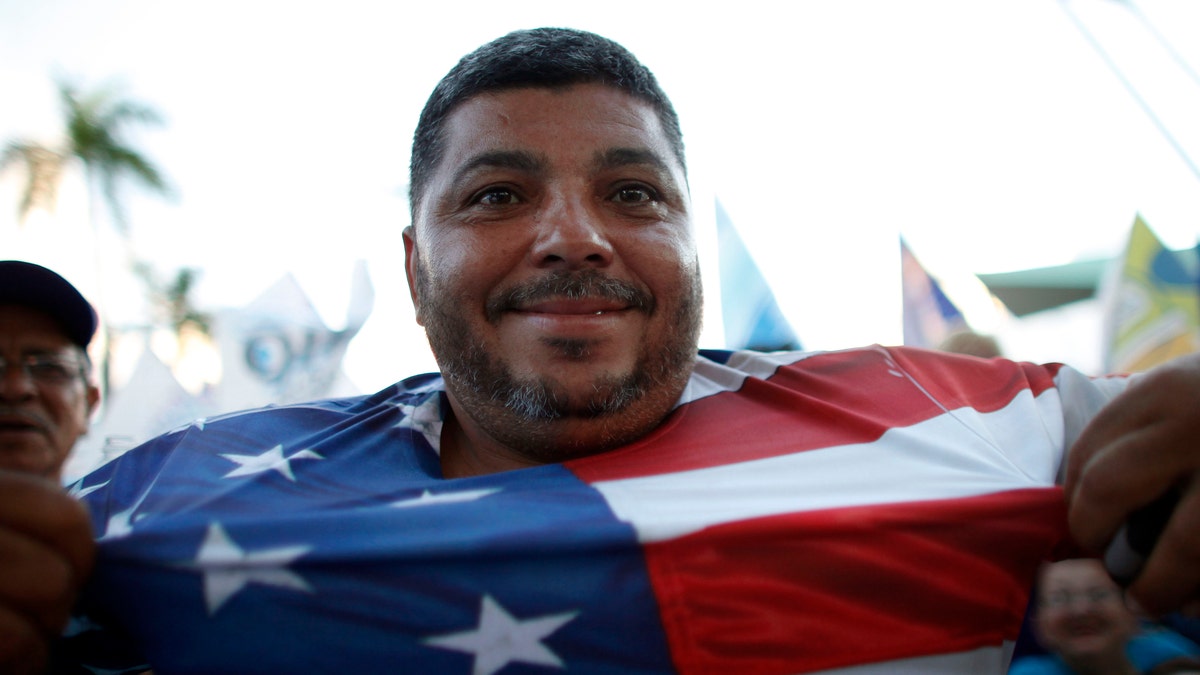
A pro-statehood New Progressive Party supporter shows his T-shirt printed with the U.S. flag at the closing campaign rally for the pro-statehood New Progressive Party in San Juan, Puerto Rico, Saturday, Nov. 3, 2012. (AP Photo/Ricardo Arduengo)
SAN JUAN, Puerto Rico – As Puerto Rican voters head to the polls on Tuesday they will once again ponder the decades-old question over the island's political future: What kind of relationship do they really want with the United States?
Do they support the status quo? Or would they prefer statehood, independence or "sovereign free association," a designation that would give the island of nearly 4 million people more autonomy?
Officially, the Caribbean island is the U.S. Commonwealth of Puerto Rico, a semi-autonomous extension of the U.S. mainland, its giant neighbor 1,000 miles to the northwest. But in fact it is a territory, lacking both the freedom of an independent country and some of the fundamental rights it would have if it was a U.S. state.
Aimed at resolving the 114-year-old conundrum over Puerto Rico's status, Tuesday's referendum marks the fourth time in 45 years that a vote has been held on the island's future. Past balloting has never given statehood a majority, and independence never garnered more than 5 percent, but debate over the territory's legal standing remains heated.
The latest vote comes at an especially difficult time for the island as it struggles to recover from an economic crisis and fights a wave of violent crime. Puerto Rico reported a record 1,117 killings last year, and its 13.6 percent unemployment is higher than that of any U.S. state.
The ballot measure's first question asks voters if they support the island's current status, while a second one offers the options of statehood, independence or sovereign free association. The U.S. Congress would have to agree to any change.
Recent surveys have said a limited majority favors the status quo in the referendum's first question. Regarding the second question, surveys found statehood and increased autonomy nearly tied, with a small percentage favoring independence.
Noel Colon Martinez, a political analyst who once ran for governor under the Puerto Rican Independence Party, said the referendum is confusing because it forces voters to choose from three options they might not favor.
Colon also said that whatever the vote's outcome, the U.S. Congress is unlikely to lend too much attention to the status debate given Puerto Rico's "pressing economic, political and social problems."
Voter turnout likely will be high, said Luis Delgado, who heads an organization that supports increased autonomy for Puerto Rico. "It's a tiny country of 4 million people coming face-to-face with the world's biggest political and economic empire," he said, describing the island's relationship with the United States.
The referendum is being held along with elections for Puerto Rico legislators and governor, with Gov. Luis Fortuno of the pro-statehood New Progressive Party seeking a second term. He is running against Alejandro Garcia Padilla of the Popular Democratic Party, which supports the island's current political status.
Even though Puerto Ricans are U.S. citizens, they cannot vote in Tuesday's U.S. presidential election. Both President Barack Obama and challenger Mitt Romney have said they support the referendum, with Obama saying he'll respect the people's will if there is a clear majority.
Backers of statehood consider Puerto Ricans' inability to vote for president an outrage, and remind voters that the island would benefit from an extra $20 billion a year in federal funds if it could become the 51st U.S. state. It would also get two seats in the U.S. Senate and five in the House of Representatives, instead of its current single congressional representative with limited voting powers.
"We don't want to continue being a colony. We want the full rights that we're entitled to as American citizens," said Thomas Rivera Schatz, president of the territory's local Senate. "Because we're a colony, we have the misfortune of being first (in line) for federal cuts and last in line for handouts."
Resident Commissioner Pedro Pierluisi, a statehood supporter who represents Puerto Rico in the U.S. House, is seeking re-election and running against Rafael Cox Alomar. Pierluisi said some people on the U.S. mainland incorrectly view Puerto Rico as a welfare state that is "too Spanish," and insisted it eventually will become a state.
"It's going to take a while for my colleagues in Congress to accept it, to deal with it," he said. "This is going to be a fight."
Those who favor the status quo insist statehood would erode the island's culture, including its use of the Spanish language.
Leoncio Burgos said he voted against statehood in the other referendums in 1967, 1993 and 1998, and will vote the same way Tuesday. Playing dominoes under a leafy tree in a public park, the 90-year-old San Juan resident said he is a lifelong member of the Popular Democratic Party, which favors the status quo.
"I have carried that in my heart since I was small," he said, tapping his chest.
Independence supporters, meanwhile, say the island should stop depending on federal funds and needs the freedom to negotiate trade agreements with any country without U.S. approval.
Juan Dalmau, gubernatorial candidate with the Puerto Rican Independence Party, compared the island's current status to a bonsai: "The Americans look at the colony as a cute, tiny little thing because it's convenient to them."
Based on reporting by the Associated Press.
Follow us on twitter.com/foxnewslatino
Like us at facebook.com/foxnewslatino












































